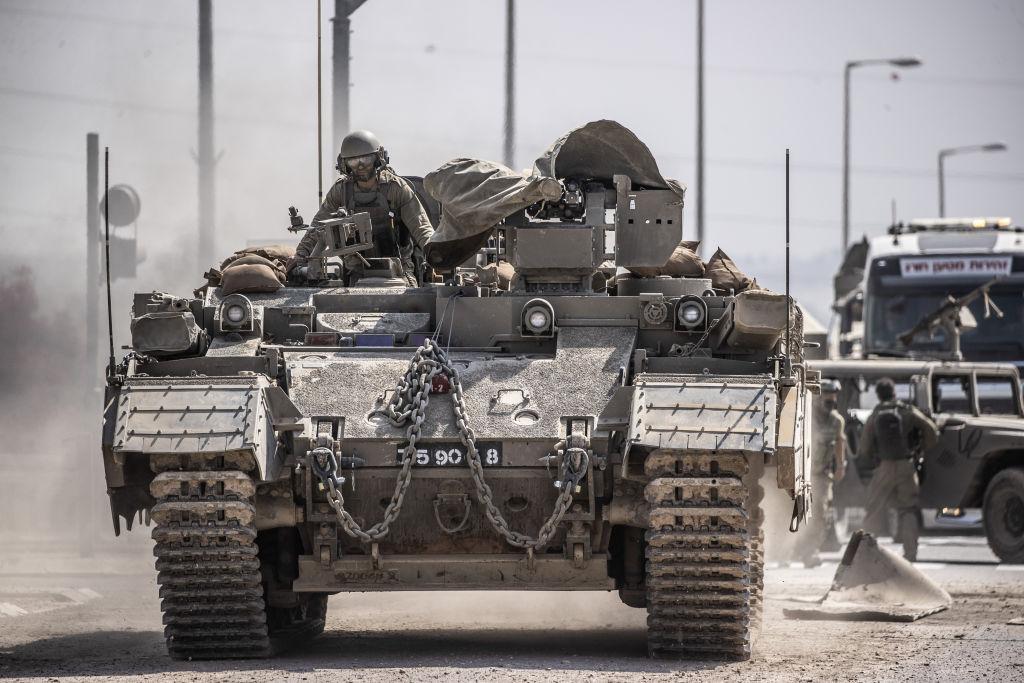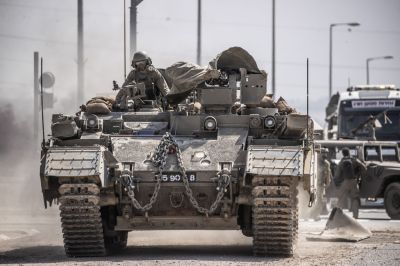After its deadly terrorist attack on October 7, any doubts about Hamas’ devotion to the destruction of Israel should be readily dismissed. But subsequent commentary on the Israel-Hamas war has often missed that Hamas is also the Palestinians’ greatest enemy. The state of Palestine would likely have come into full existence long ago had Hamas (and Hezbollah) never existed. The best way to stand with the Palestinians is to support Israel’s war to destroy Hamas.
No morally serious discussion of the Israel-Hamas war can start without the premise that Israel and Palestine both have a right to exist as separate, sovereign states of equal legitimacy. That was the premise of the United Nations’ 1947 partition plan (which the Jewish Agency for Palestine—the predecessor to the Israeli government—accepted and the Arab states did not).
It is also the premise of the 1995 Oslo Accords, which among other things established the Palestinian National Authority as the sole legitimate representative of the Palestinian people. Through the Oslo accords, the Palestinian Authority recognized Israel’s right to exist. The two parties disagreed about their borders and security arrangements, but they agreed that the basic principle of mutual recognition is the bedrock of any plausible, lasting peace.
Yet Hamas rejects both Israel’s existence and the Palestinian Authority’s legitimacy. It fought a war against the Palestinian Authority in 2007, seized military control over the Gaza Strip, and set up an authoritarian government there.
Hamas does not respect the human rights of its own Palestinian population, let alone of neighboring Israelis. According to Amnesty International—hardly an Israeli apologist—Palestinian authorities “unduly restrict freedom of expression, association and assembly, at times using excessive force to disperse peaceful gatherings.” They singled out Hamas’ government in Gaza for “a general climate of repression, following a brutal crackdown on peaceful protests.”
Israel and Palestine recognize each other’s right to exist within the territory of the former British Mandate of Palestine, but Hamas is a spoiler. Today, 165 nations recognize Israel as a legitimate sovereign state, and 139 recognize the Palestinian National Authority as the government of a sovereign Palestinian state. Yet Hamas thinks it knows better.
Some who sympathize with the Palestinians seem eager to downplay or excuse Hamas’ terrorism done in the Palestinians’ name. That is a gross mistake and political miscalculation. Terrorism delegitimizes the Palestinian cause and makes it very difficult to advocate for the Palestinians without becoming complicit with terrorism.
Hamas claims Israel’s very existence is a form of imperial occupation; that there should be no Israel at all; that Palestinians should own the totality of the former British Mandate of Palestine. Some parts of the American campus left clearly sympathize with this view, as shown by rallies and protests in favor of Hamas since the attacks. But protesters need to understand that their view is not shared by the Palestinian National Authority, the United Nations, or the overwhelming majority of countries and people on earth.
On the other hand, their view is shared by Hamas, al-Qaeda, Hezbollah, and Iran.
Hamas itself openly states its goal: the complete destruction and eradication of Israel and the rejection of any negotiated settlement to the territorial dispute between Israel and Palestine. That is an open avowal of genocidal intent. Hamas intends to carry out ethnic cleansing until there are no Jews anywhere in the territory.
Hamas aims to grant Hitler a posthumous victory. If you find yourself on the same side as al-Qaeda and Hitler, maybe take a long look in the mirror. You’ve lost the plot.
Again, some who sympathize with the Palestinian cause seem eager to find fault with Israeli settlements, with the Israeli presence in the West Bank, or its policy toward its own Arab citizens. Those are legitimate debates. By all means, Israel should treat all citizens equally at home and find a lasting modus vivendi with Palestine. Israel is neither faultless nor above criticism.
But just as the time to debate the wisdom of NATO expansion is not during Russia’s invasion of Ukraine—we don’t negotiate with Russia while it’s holding a gun to our head—this is not the right moment to nitpick Israel’s past faults, within days of the worst terrorist attack and civilian loss of life in Israel’s history.
To do so is politically tone deaf and a form of geopolitical whataboutism. Okay, so Hamas murdered a few hundred civilians on purpose, but what about Israel’s settler policy? That’s the same kind of mindless tribalism that infects the American culture war. Who cares about the crimes of my side, so long as my side benefits? What about the other side’s crimes?
That sort of whataboutism is not rational argument. It is dogma recited by unthinking partisans looking for an excuse to kill people. And it typically involves false moral equivalences and cherry-picked evidence.
For example, in response to the litany of Hamas’ crimes, some respond that Israel is also guilty of terrorism and war crimes through “indiscriminate” airstrikes on civilian infrastructure. But there is no moral equivalence between Hamas’ deliberate, open murder of civilians—which they do not deny and openly celebrate—and inadvertent civilian casualties from Israeli airstrikes.
Could Israel be more restrained? Could it work harder to avoid civilian casualties? Probably. If I were advising the Israeli military, I would suggest they bend over backward to show concern for the civilian population and frame this as a war to liberate the Palestinian people from Hamas. As Israel prepares for a ground war in Gaza, its evacuation order to Gazan civilians and its decision to cut off water and power to the Gaza strip should be weighed carefully against the requirements of military necessity and discrimination.
But I would also remind the international media that it is a war crime to engage in hostilities without wearing identifiable uniforms; to hide among a civilian population; and to use civilians as human shields. Hamas does all of the above. The moral and legal responsibility for placing Palestinians in harm’s way lies first and most heavily with Hamas. The Geneva Conventions are clear: If a combatant uses a school, hospital, or religious facility for a military purpose, it is no longer a protected civilian location. It is a legitimate military target.
That does not mean it is strategically wise to engage such targets. Israel may be walking into a trap, doing exactly what Hamas hopes. Again, I would counsel restraint and ample provision for civilian refugees. The point is that Israel is within its right of self-defense to fight Hamas—even when Hamas hides in homes, hospitals, or mosques—and there is no moral equivalence with Hamas’ deliberate targeting of civilians.
It is a frustrating debate to have because these fine distinctions are only necessary for those whose predisposition lies so heavily with Hamas that they can no longer see the morally relevant facts.
The fact is that Hamas is an obstacle to the Palestinians’ aspirations, Israel’s security, and world order. Israel and Palestine would undoubtedly have made more progress implementing the Oslo Accords—including the transfer of more power to the Palestinian National Authority—without the constant threat of Hamas’ violence (and Hezbollah’s) hanging over negotiations for the past 30 years.
Israel’s operation this week should aim at Hamas’ destruction, Gaza’s liberation, and the reunification of Gaza with the West Bank under the legitimate government of the Palestinian National Authority. As a chaser, Israel should redouble its diplomatic outreach to Saudi Arabia.
Hamas’ offensive was likely initiated at Iran’s prodding; it is Iran’s attempt to derail the U.S.-Israeli efforts to bring Saudi Arabia into the Abraham Accords by stirring up a nasty war that divides Israel from its Arab neighbors. Denying Iran that diplomatic coup would be a crucial finishing touch to Israel’s military operation.
The campus protesters have entirely missed the point. Israel has an opportunity to root out Hamas and cut off one of Iran’s biggest proxies in the region. Such a move would do more for the Palestinians than any American campus protest has ever accomplished. If you care about the Palestinians, you should support the Israeli military.
Click here for more coverage of the war in Israel.







Please note that we at The Dispatch hold ourselves, our work, and our commenters to a higher standard than other places on the internet. We welcome comments that foster genuine debate or discussion—including comments critical of us or our work—but responses that include ad hominem attacks on fellow Dispatch members or are intended to stoke fear and anger may be moderated.
With your membership, you only have the ability to comment on The Morning Dispatch articles. Consider upgrading to join the conversation everywhere.